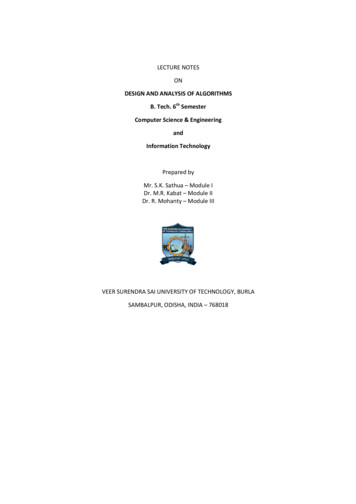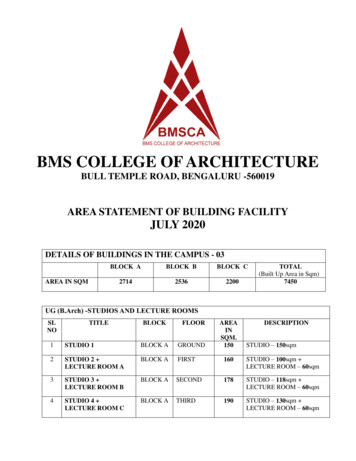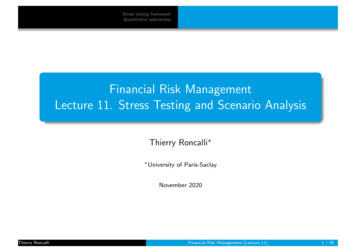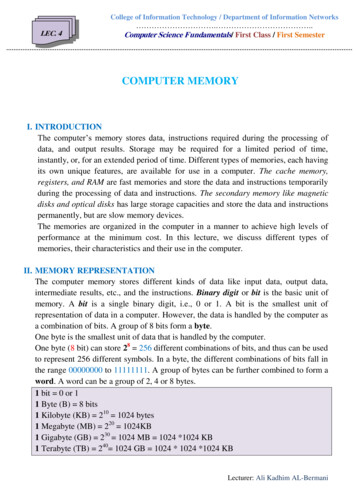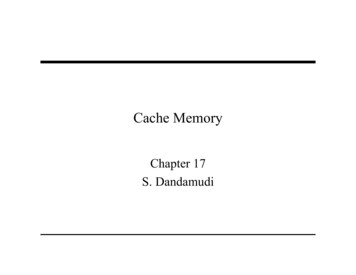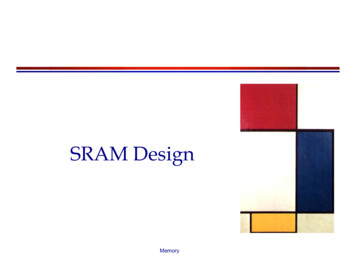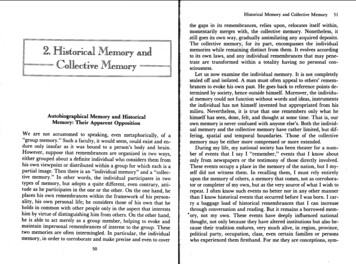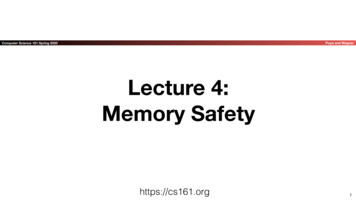
Transcription
Popa and WagnerComputer Science 161 Spring 2020Lecture 4:Memory Safetyhttps://cs161.org1
AnnouncementsComputer Science 161 Spring 2020Popa and Wagner Homework 0 due Friday. Expect Homework 1 to be released later this week.2
Popa and WagnerComputer Science 161 Spring 2020Buffer Overflows3
-0xC0000000To previous savedframe pointeruser stackargumentsreturn addresssaved frame pointershared librariesexception handlers-0x40000000run time heaplocal variablesTo the point at whichthis function was calledcallee saved registersstatic datasegmenttext segment(program)unused-0x08048000-0x000000004
void safe() {char buf[64];.fgets(buf, 64, stdin);.}5
void safer() {char buf[64];.fgets(buf, sizeof(buf), stdin);.}6
Assume these are both underthe control of an attacker.void vulnerable(int len, char *data) {char buf[64];if (len 64)return;memcpy(buf, data, len);}memcpy(void *s1, const void *s2, size t n);size t is unsigned:What happens if len -1?7
void safe(size t len, char *data) {char buf[64];if (len 64)return;memcpy(buf, data, len);}8
void f(size t len, char *data) {char *buf malloc(len 2);if (buf NULL) return;memcpy(buf, data, len);buf[len] '\n';buf[len 1] '\0';}Is it safe? Talk to your partner.Vulnerable!If len 0xffffffff, allocates only 1 byte9
10
Popa and WagnerComputer Science 161 Spring 2020Memory Safety11
void vulnerable() {char buf[64];if (fgets(buf, 64, stdin) NULL)return;printf(buf);}12
printf("you scored %d\n", score);13
sfpp r i n t f (“ y o u s c o r e d %d\ n ”, s c o r e ) 46414
printf("a %s costs %d\n", item, price);15
sfpp r i n t f (" a %s c o s t s %d\ n ", i t e m , p r i c e ) ;priceitem0x8048464ripsfpprintf()\0\n sos%d%stca0x804846416
Fun With printf format strings.Popa and WagnerComputer Science 161 Spring 2020Format argument is missing!printf("100% dude!");17
sfpp r i n t f (“100% dude !”) ;?0x8048464ripsfpprintf()\0!dud%00e10x804846418
More Fun With printf format strings.Popa and WagnerComputer Science 161 Spring 2020printf("100% dude!"); prints value 4 bytes above retaddr as integerprintf("100% sir!"); prints bytes pointed to by that stack entryup through first NULprintf("%d %d %d %d ."); prints series of stack entries as integersprintf("%d %s"); prints value 8 bytes above retaddr plus bytespointed to by preceding stack entryprintf("100% nuke’m!");What does the %n format do?19
%n writes the number of characters printed so farinto the corresponding format argument.int report cost(int item num, int price) {int colon offset;printf("item %d:%n %d\n", item num,&colon offset, price);return colon offset;}report cost(3, 22) prints "item 3: 22"and returns the value 7report cost(987, 5) prints "item 987: 5"and returns the value 920
Fun With printf format strings.Popa and WagnerComputer Science 161 Spring 2020printf("100% dude!"); prints value 4 bytes above retaddr as integerprintf("100% sir!"); prints bytes pointed to by that stack entryup through first NULprintf("%d %d %d %d ."); prints series of stack entries as integersprintf("%d %s"); prints value 8 bytes above retaddr plus bytespointed to by preceding stack entryprintf("100% nuke’m!"); writes the value 3 to the address pointed to by stack entry21
void safe() {char buf[64];if (fgets(buf, 64, stdin) NULL)return;printf("%s", buf);}22
It isn't just the stack.Computer Science 161 Spring 2020Popa and Wagner Control flow attacks require that the attacker overwrite apiece of memory that contains a pointer for future codeexecution The return address on the stack is just the easiest target You can cause plenty of mayhem overwriting memory in theheap. And it is made easier when targeting C Allows alternate ways to hijack control flow of the program23
Compiler Operation:Compiling Object Oriented CodePopa and WagnerComputer Science 161 Spring 2020class Fooint i,publicpublic.{j, k;virtual void bar(){ . }virtual void baz(){ . }vtable ptr (class Foo)ijkptr to Foo::barptr to Foo::baz.24
A Few Exploit TechniquesComputer Science 161 Spring 2020Popa and Wagner If you can overwrite a vtable pointer It is effectively the same as overwriting the return address pointer on the stack:When the function gets invoked the control flow is hijacked to point to the attacker’s code The only difference is that instead of overwriting with a pointer you overwrite it with a pointer to atable of pointers. Heap Overflow: A buffer in the heap is not checked:Attacker writes beyond and overwrites the vtable pointer of the next object in memory Use-after-free: An object is deallocated too early:Attacker writes new data in a newly reallocated block that overwrites the vtable pointerObject is then invoked25
Magic Numbers & Exploitation Computer Science 161 Spring 2020Popa and Wagner Exploits can often be very brittle You see this on your Project 1: Your ./egg will not work on someone else’sVM because the memory layout is different Making an exploit robust is an art unto itself EXTRABACON is an NSA exploit for Cisco ASA “Adaptive SecurityAppliances”It had an exploitable stack-overflow vulnerability in the SNMP read operationBut actual exploitation required two steps:Query for the particular version (with an SMTP read)Select the proper set of magic numbers for that version26
A hack that helps:NOOP sled.Computer Science 161 Spring 2020Popa and Wagner Don't just overwrite the pointer and then provide the codeyou want to execute. Instead, write a large number of NOOP operations Instructions that do nothing Now if you are a little off, it doesn't matter Since if you are close enough, control flow will land in the sled and startrunning.27
ETERNALBLUEComputer Science 161 Spring 2020Popa and Wagner ETERNALBLUE is another NSA exploit Stolen by the same group ("ShadowBrokers") which stole EXTRABACONRemote exploit for Windows through SMBv1 (Windows File sharing) Eventually it was very robust. But initially it was jokingly called ETERNALBLUESCREEN, because it wouldcrash Windows computers more reliably than exploitation.28
Memory SafetyComputer Science 161 Spring 2020Popa and Wagner Memory Safety: No accesses to undefined memory "Undefined" is with respect to the semantics of the programming languageRead Access: attacker can read memory that he isn't supposed toWrite Access: attacker can write memory that she isn't supposed toExecute Access: transfer control flow to memory they aren’t supposed to Spatial safety: No access out of bounds Temporal safety: No access before or after lifetime of object29
30
Reasoning About SafetyComputer Science 161 Spring 2020Popa and Wagner How can we have confidence that our code executes in a safe (and correct,ideally) fashion? Approach: build up confidence on a function-by-function / module-by-modulebasis Modularity provides boundaries for our reasoning: Preconditions: what must hold for function to operate correctlyPostconditions: what holds after function completes These basically describe a contract for using the module Notions also apply to individual statements (what must hold for correctness;what holds after execution) Stmt #1’s postcondition should logically imply Stmt #2’s preconditionInvariants: conditions that always hold at a given point in a function (this particularly matters for loops)31
int deref(int *p) {return *p;}Precondition?32
/* requires: p ! NULL(and p a valid pointer) */int deref(int *p) {return *p;}Precondition: what needs to hold for function tooperate correctly.Needs to be expressed in a way that a person writingcode to call the function knows how to evaluate.33
void *mymalloc(size t n) {void *p malloc(n);if (!p) { perror("malloc"); exit(1); }return p;}Postcondition?34
/* ensures: retval ! NULL (and a valid pointer) */void *mymalloc(size t n) {void *p malloc(n);if (!p) { perror("malloc"); exit(1); }return p;}Postcondition: what the function promises willhold upon its return.Likewise, expressed in a way that a person usingthe call in their code knows how to make use of.35
int sum(int a[], size t n) {int total 0;for (size t i 0; i n; i )total a[i];return total;}Precondition?36
int sum(int a[], size t n) {int total 0;for (size t i 0; i n; i )total a[i];return total;}General correctness proof strategy for memory safety:(1) Identify each point of memory access(2) Write down precondition it requires(3) Propagate requirement up to beginning of function37
int sum(int a[], size t n) {int total 0;for (size t i 0; i n; i )total a[i];return total;}General correctness proof strategy for memory safety:(1) Identify each point of memory access?(2) Write down precondition it requires(3) Propagate requirement up to beginning of function38
int sum(int a[], size t n) {int total 0;for (size t i 0; i n; i )total a[i];return total;}General correctness proof strategy for memory safety:(1) Identify each point of memory access(2) Write down precondition it requires(3) Propagate requirement up to beginning of function39
int sum(int a[], size t n) {int total 0;for (size t i 0; i n; i )/* ? */total a[i];return total;}General correctness proof strategy for memory safety:(1) Identify each point of memory access(2) Write down precondition it requires?(3) Propagate requirement up to beginning of function40
int sum(int a[], size t n) {int total 0;for (size t i 0; i n; i )/* requires: a ! NULL &&0 i && i size(a) */total a[i];return total;} size(X) number of elements allocated for region pointed to by Xsize(NULL) 0General correctness proof strategy for memory safety:This is anabstractnot somethingbuilt into C (like sizeof).(1) Identifyeachpointnotion,of memoryaccess(2) Write down precondition it requires(3) Propagate requirement up to beginning of function41
int sum(int a[], size t n) {int total 0;for (size t i 0; i n; i )/* requires: a ! NULL &&0 i && i size(a) */total a[i];return total;}General correctness proof strategy for memory safety:(1) Identify each point of memory access(2) Write down precondition it requires(3) Propagate requirement up to beginning of function?42
int sum(int a[], size t n) {int total 0;for (size t i 0; i n; i )/* requires: a ! NULL &&0 i && i size(a) */total a[i];return total;}Let’s simplify, given that a never changes.43
/* requires: a ! NULL */int sum(int a[], size t n) {int total 0;for (size t i 0; i n; i )/* requires: 0 i && i size(a) */total a[i];return total;}44
/* requires: a ! NULL */int sum(int a[], size t n) {int total 0;for (size t i 0; i n; i )/* requires: 0 i && i size(a) */total a[i];return total;}General correctness proof strategy for memory safety:(1) Identify each point of memory access(2) Write down precondition it requires(3) Propagate requirement up to beginning of function?45
/* requires: a ! NULL */int sum(int a[], size t n) {int total 0;for (size t i 0; i n; i )/* requires: 0 i && i size(a) */total a[i];return total;}?General correctness proof strategy for memory safety:(1) Identify each point of memory access(2) Write down precondition it requires(3) Propagate requirement up to beginning of function?46
/* requires: a ! NULL */int sum(int a[], size t n) {int total 0;for (size t i 0; i n; i )/* requires: 0 i && i size(a) */total a[i];return total;} General correctness proof strategy for memory safety:(1) Identify each point of memory access(2) Write down precondition it requires(3) Propagate requirement up to beginning of function?47
/* requires: a ! NULL */int sum(int a[], size t n) {int total 0;for (size t i 0; i n; i )/* requires: 0 i && i size(a) */total a[i];return total;} The 0 i part is clear, so let’s focus for now on the rest.48
/* requires: a ! NULL */int sum(int a[], size t n) {int total 0;for (size t i 0; i n; i )/* requires: i size(a) */total a[i];return total;}49
/* requires: a ! NULL */int sum(int a[], size t n) {int total 0;for (size t i 0; i n; i )/* requires: i size(a) */total a[i];return total;}?General correctness proof strategy for memory safety:(1) Identify each point of memory access(2) Write down precondition it requires(3) Propagate requirement up to beginning of function?50
/* requires: a ! NULL */int sum(int a[], size t n) {int total 0;for (size t i 0; i n; i )/* invariant?: i n && n size(a) *//* requires: i size(a) */total a[i];return total;}?General correctness proof strategy for memory safety:(1) Identify each point of memory access(2) Write down precondition it requires(3) Propagate requirement up to beginning of function?51
/* requires: a ! NULL */int sum(int a[], size t n) {int total 0;for (size t i 0; i n; i )/* invariant?: i n && n size(a) *//* requires: i size(a) */total a[i];return total;}?How to prove our candidate invariant?n size(a) is straightforward because n never changes.52
/* requires: a ! NULL && n size(a) */int sum(int a[], size t n) {int total 0;for (size t i 0; i n; i )/* invariant?: i n && n size(a) *//* requires: i size(a) */total a[i];return total;}53
/* requires: a ! NULL && n size(a) */int sum(int a[], size t n) {int total 0;for (size t i 0; i n; i )/* invariant?: i n && n size(a) *//* requires: i size(a) */total a[i];return total;}?What about i n ?54
/* requires: a ! NULL && n size(a) */int sum(int a[], size t n) {int total 0;for (size t i 0; i n; i )/* invariant?: i n && n size(a) *//* requires: i size(a) */total a[i];return total;}?What about i n ? That follows from the loop condition.55
/* requires: a ! NULL && n size(a) */int sum(int a[], size t n) {int total 0;for (size t i 0; i n; i )/* invariant: i n && n size(a) *//* requires: i size(a) */total a[i];return total;}At this point we know the proposed invariant will always hold.56
/* requires: a ! NULL && n size(a) */int sum(int a[], size t n) {int total 0;for (size t i 0; i n; i )/* invariant: i n && n size(a) *//* requires: i size(a) */total a[i];return total;} and we’re done!57
/* requires: a ! NULL && n size(a) */int sum(int a[], size t n) {int total 0;for (size t i 0; i n; i )/* invariant: a ! NULL &&0 i && i n && n size(a) */total a[i];return total;}A more complicated loop might need us to use induction:Base case: first entrance into loop.Induction: show that postcondition of last statement ofloop, plus loop test condition, implies invariant.58
int sumderef(int *a[], size t n) {int total 0;for (size t i 0; i n; i )total *(a[i]);return total;}59
/* requires: a ! NULL &&size(a) n &&?int sumderef(int *a[], size t n) {int total 0;for (size t i 0; i n; i )total *(a[i]);return total;}*/60
/* requires: a ! NULL &&size(a) n &&for all j in 0.n-1, a[j] ! NULL */int sumderef(int *a[], size t n) {int total 0;for (size t i 0; i n; i )total *(a[i]);return total;}This may still be memory safebut it can still have undefined behavior!61
char *tbl[N]; /* N 0, has type int */int hash(char *s) {int h 17;while (*s)h 257*h (*s ) 3;return h % N;}bool search(char *s) {int i hash(s);return tbl[i] && (strcmp(tbl[i], s) 0);}62
char *tbl[N];/* ensures: ? */int hash(char *s) {int h 17;while (*s)h 257*h (*s ) 3;return h % N;}bool search(char *s) {What is the correct postcondition for hash()?int i hash(s);(a)return0 retval N,(b)0 retval,tbl[i] && (strcmp(tbl[i], s) 0);(c)} retval N, (d) none of the above.Discuss with a partner.63
char *tbl[N];/* ensures: ? */int hash(char *s) {int h 17;while (*s)h 257*h (*s ) 3;return h % N;}bool search(char *s) {What is the correct postcondition for hash()?int i hash(s);(a)return0 retval N,(b)0 retval,tbl[i] && (strcmp(tbl[i], s) 0);(c)} retval N, (d) none of the above.Discuss with a partner.64
char *tbl[N];/* ensures: ? */int hash(char *s) {int h 17;while (*s)h 257*h (*s ) 3;return h % N;}bool search(char *s) {What is the correct postcondition for hash()?int i hash(s);(a)return0 retval N,(b)0 retval,tbl[i] && (strcmp(tbl[i], s) 0);(c)} retval N, (d) none of the above.Discuss with a partner.65
char *tbl[N];/* ensures: ? */int hash(char *s) {int h 17;while (*s)h 257*h (*s ) 3;return h % N;}bool search(char *s) {What is the correct postcondition for hash()?int i hash(s);(a)return0 retval N,(b)0 retval,tbl[i] && (strcmp(tbl[i], s) 0);(c)} retval N, (d) none of the above.Discuss with a partner.66
char *tbl[N];/* ensures: ? */int hash(char *s) {int h 17;while (*s)h 257*h (*s ) 3;return h % N;}bool search(char *s) {What is the correct postcondition for hash()?int i hash(s);(a)return0 retval N,(b)0 retval,tbl[i] && (strcmp(tbl[i], s) 0);(c)} retval N, (d) none of the above.Discuss with a partner.67
char *tbl[N];/* ensures: 0 retval && retval N */int hash(char *s) {int h 17;/* 0 h */while (*s)h 257*h (*s ) 3;return h % N;}bool search(char *s) {int i hash(s);return tbl[i] && (strcmp(tbl[i], s) 0);}68
char *tbl[N];/* ensures: 0 retval && retval N */int hash(char *s) {int h 17;/* 0 h */while (*s)/* 0 h */h 257*h (*s ) 3;return h % N;}bool search(char *s) {int i hash(s);return tbl[i] && (strcmp(tbl[i], s) 0);}69
char *tbl[N];/* ensures: 0 retval && retval Nint hash(char *s) {int h 17;/* 0 while (*s)/* 0 h 257*h (*s ) 3;/* 0 return h % N;}*/h */h */h */bool search(char *s) {int i hash(s);return tbl[i] && (strcmp(tbl[i], s) 0);}70
char *tbl[N];/* ensures: 0 retval && retval Nint hash(char *s) {int h 17;/* 0 while (*s)/* 0 h 257*h (*s ) 3;/* 0 return h % N; /* 0 retval N */}*/h */h */h */bool search(char *s) {int i hash(s);return tbl[i] && (strcmp(tbl[i], s) 0);}71
char *tbl[N];/* ensures: 0 retval && retval Nint hash(char *s) {int h 17;/* 0 while (*s)/* 0 h 257*h (*s ) 3;/* 0 return h % N; /* 0 retval N */}*/h */h */h */bool search(char *s) {int i hash(s);return tbl[i] && (strcmp(tbl[i], s) 0);}72
char *tbl[N];/* ensures: 0 retval && retval N */unsigned int hash(char *s) {unsigned int h 17;/* 0 hwhile (*s)/* 0 hh 257*h (*s ) 3;/* 0 hreturn h % N;/* 0 retval N}*/*/*/*/bool search(char *s) {unsigned int i hash(s);return tbl[i] && (strcmp(tbl[i], s) 0);}73
Memory safe languagesComputer Science 161 Spring 2020Popa and Wagner Do you honestly think a human is going to go through thisprocess for all their code? Because that is what it takes to prevent undefined memory behavior in C or C Instead, use a safe language: Turns "undefined" memory references into an immediate exception or programterminationNow you simply don't have to worry about buffer overflows and similarvulnerabilities Plenty to chose from: Python, Java, Go, Rust, Swift, C#, Pretty much everything other thanC/C /Objective C74
printf("100% dude!"); prints value 4 bytes above retaddr as integer printf("100% sir!"); prints bytes pointed to by that stack entry up through first NUL printf("%d %d %d %d ."); prints series of stack entries as integers printf("%d %s"); prints value 8 bytes above retaddr plus bytes pointed to by preceding stack entry
